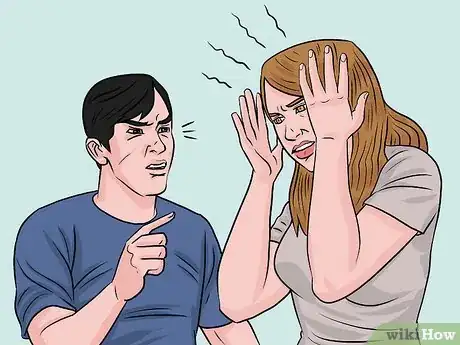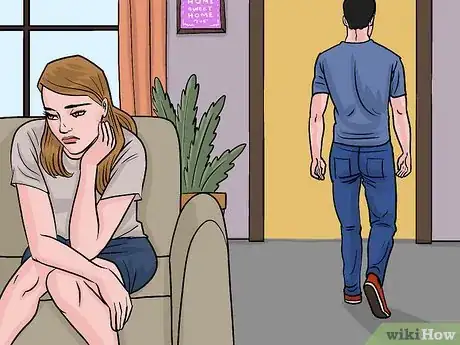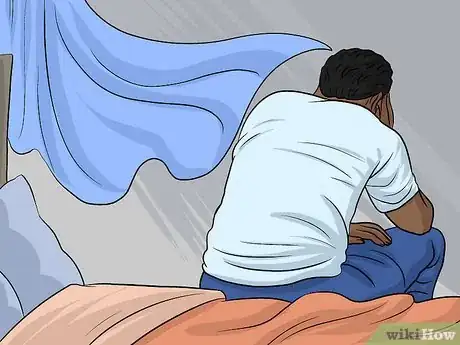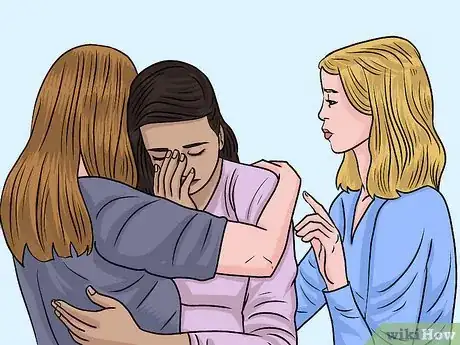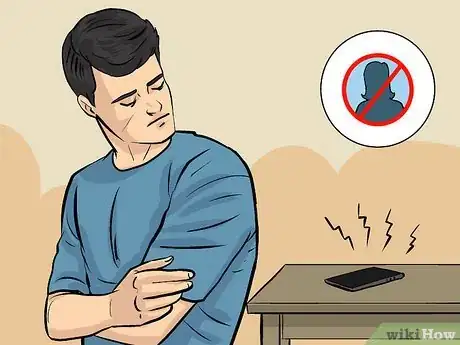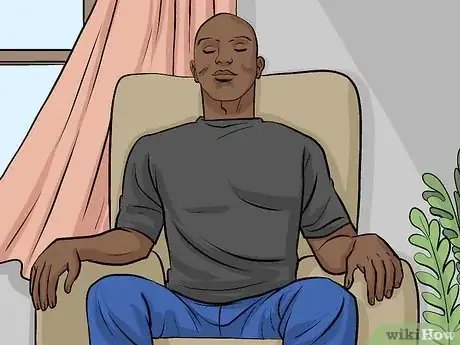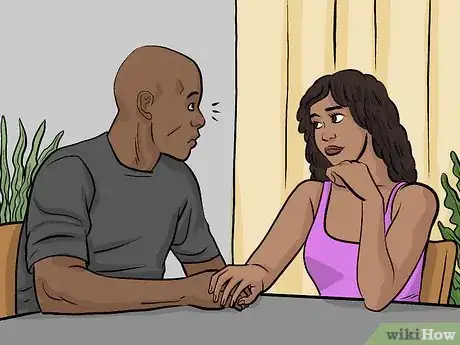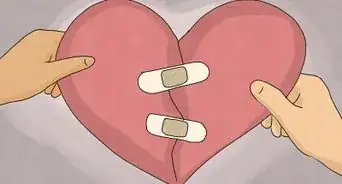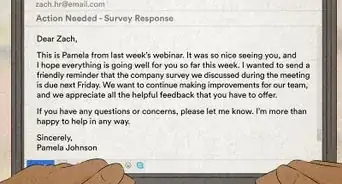This article was co-authored by Asa Don Brown, PhD, DNCCM, FAAETS and by wikiHow staff writer, Aly Rusciano. Dr. Asa Don Brown is a Clinical Psychologist with over 25 years of experience. He specializes in working with families, children, and couples, treating a variety of psychological disorders, trauma, and abuse. Dr. Brown has specialized in negotiation and profiling. He is also a prolific author having published three books and numerous articles in magazines, journals, and popular publications. Dr. Brown earned a BS in Theology and Religion with a minor in Marketing and an MS in Counseling with a specialization in Marriage and Family from The University of Great Falls. Furthermore, he received a PhD in Psychology with a specialization in Clinical Psychology from Capella University. He is also a candidate for a Masters of Liberal Arts through Harvard University. Dr. Brown is a Fellow of the American Academy of Experts in Traumatic Stress and a Diplomate for the National Center for Crisis Management and continues to serve a number of psychological and scientific boards.
There are 8 references cited in this article, which can be found at the bottom of the page.
This article has been viewed 6,697 times.
Things can get tricky in a dead end relationship. Maybe the romance has faded and you don’t feel the same passion you once did, or the relationship has grown toxic and you’re ready to end things before they get worse. If you’re in a dead end relationship, you most likely lost feelings for your partner and are ready to move on, but how can you do that? We know leaving and healing from a relationship can be hard, so we’ve answered your questions on how you can move on from a dead end relationship.
Steps
What are the signs of a dead end relationship?
-
1The relationship has become negative. When you first started dating, you and your partner were probably on Cloud 9. Everything was wonderful, and you were most likely optimistic about the future. But when that euphoria fades, a relationship can become abusive or one-sided because of:[2]
- Constant fighting and bickering. Arguments can quickly turn aggressive in a dead end relationship..
- A lack of physical intimacy. This can be a sign that you or your partner have lost feelings.
- Poor communication. This is common in failing relationships.
-
2You’re unhappy in the relationship. A partner should make you feel loved, supported, and cherished. If you’re suddenly unhappy in a relationship, assess the situation. Is your unhappiness geared toward your partner? Is the relationship leaving you unfulfilled emotionally and intimately?[3]
- A state of unhappiness could be from ignoring your needs to prioritize theirs. Ask yourself if you’re supporting yourself the same way you’re supporting them, and if they’re supporting you in return.
-
3You and your partner don’t have time for each other. When you first started dating, you probably wanted to spend every minute of your free time together. Now, all you want to do is spend time with yourself or other people.[4]
- Ask yourself why you’re avoiding your partner. Are you suddenly annoyed by their habits, or not connecting with them emotionally?
- Attraction in strong, healthy relationships shouldn’t fade with time, so think about if these annoyances are something you can work through or if they’re something you can’t ignore.
How do I know I need to move on from a dead end relationship?
-
1If you feel like the relationship has no potential of moving forward. Making the decision of leaving a relationship isn’t easy, but sometimes it’s what’s best for both you and your partner. It’ll be difficult to see a future with your partner if you’ve fallen out of love. So, picture where you want to be in 5 days, 5 weeks, and even 5 years. Do you see you and your partner happily together? Answer these questions to see if the relationship is at a standstill:[5]
- Is my relationship negatively affecting other parts of my life?
- Do I feel constantly upset and lonely?
- Am I anxious or desperate toward my partner?
- Has my relationship negatively affected my friendships?
-
2You’re unhappy. The number one priority when asking yourself if it’s time to end a relationship is you. Your wellbeing matters most of all, so does your partner make you happy? If the answer is “no,” maybe it’s time to consider moving on from the relationship.
How do I leave a dead end relationship?
-
1Be honest with yourself first and foremost. If you’re unhappy in the situation and start to recognize the signs that you’re in a dead end relationship, don’t sugarcoat the situation. We can be our worst critics, especially when it comes to love, so silence that inner critic and realistically reflect on the relationship.[6]
- Your inner critic may say things like, “No one will ever love you,” and, “You can’t trust people.”
- Silence these negative thoughts by reminding yourself how amazing you are. Try responding to your inner critic by saying, “I am worthy of love and respect,” and, “I am a caring and loving person, and can trust people because everyone isn’t bad.”[7]
- Instead of idealizing the relationship, look at it for what it is. Remember the struggles and hardships rather than forgetting the pain. This can help you come to terms with your decision.
-
2Have an open conversation with your partner about why you want to break up. If you don’t express your concerns, how will your partner know what you’re feeling? Being honest with your partner face-to-face can clear the air and possibly give you both closure.[8]
- Even if the relationship is rocky, be respectful of your partner. They might be hurting as much as you are.
- Try to avoid texting or calling them if you can. These types of conversations are best to do in-person.
-
3Ask for support from loved ones. Leaving a relationship is hard, and you don’t need to do it alone. Reach out to friends and family members for support on this journey of healing. Talk to people you trust about why you want to leave the relationship and how you feel about moving on. You can ask for their advice, or simply ask that they be there to listen.[9]
- Go to those who make you feel loved, are positive, and help you feel like yourself.
- Seek help from a licensed counselor or law enforcement if you feel unsafe in any way.
How do I move on from a dead end relationship?
-
1Address your feelings about the relationship. It’s important to acknowledge all of your emotions, even those that are more difficult to understand. You may be feeling lost, frustrated, angry, and sad. Every feeling is valid, and it’s important to be aware of why you may be feeling the way you are. Acknowledging, reflecting, and letting go of your feelings can help you move on.[10]
- Emotions come in waves: they arrive, peak, and then subside.
- When a wave of emotion hits, accept that it’s okay to be emotional and confused, letting the feeling wash over you.
- When the wave falls back, reflect on why you may have felt the way you did by asking yourself, “What was I feeling?” and, “Why did I feel that way?”
- Remember that there is no time limit for moving on. Every person is different. Every relationship is different. Go at your own pace and listen to what you need.
-
2Go no contact with your ex to give yourself time to recover. Breakups are hard, even when they end a dead end relationship, and moving on takes time. Do your best to distance yourself from your ex, especially right after the break up. Stopping contact can help you process your emotions and heal.[11]
- Stay clear of their social media by muting their accounts.
- Ask mutual friends to not invite you places where your ex might be.
- If you have to communicate with your ex, stay on topic and be clear and concise. Try to avoid talking about the relationship.
-
3Try new things or get back to old hobbies. One of the keys to moving on is keeping yourself busy. When you leave a relationship, you may find yourself with more free time on your hands. Take this extra time to explore something that interests you. Maybe that’s trying out a new craft, or starting up a long lost hobby. Find something that’ll bring you joy and keep your mind off your ex.[12]
- Sign up for a weekly fitness class. This will get your heart racing and give you an outlet for any lingering emotions.
- Start a new painting, knitting project, or other craft. This can calm your mind and give you a sense of accomplishment.
- Schedule weekly meetings with friends. This can help you socialize and remind yourself you deserve to be loved.
What could stand in my way of moving on?
-
1Your own feelings. There’s no doubt that breakups can be confusing, and when you leave a dead end relationship, you may find yourself more confused than ever. On one hand, you may be happy to have left an unfulfilling relationship; while on the other hand, you may be grieving the joyful relationship you once had. Both of these feelings are valid, and it’s important to remember that you can and will get past this with time.[13]
- Sort through your emotions by practicing mindfulness. Taking time each day to close your eyes and breathe through moments of anxiety, frustration, or doubt can help you calm down and reflect on your feelings.
- Practice self-care to work through confusion after a breakup. Aim to get at least 7 hours of sleep, eat a nutritious diet, and move your body. Caring for yourself can boost your self-esteem and help you find balance again.
-
2Your ex showing remorse after the breakup. It can be easy to start second guessing your decision to move on when your ex suddenly starts to fix their behavior. Now that the relationship’s over, they may try everything to get you back, but stand your ground. Remember reasons for leaving and why you want to move on.
- This could be your ex’s way of manipulating you. If you recognized that the relationship was going nowhere, stick to your instincts.
- An on-again, off-again relationship can weigh heavily on you, so stay true to your word when you leave your ex to protect your mental health.[14]
How can I be kind to myself while moving on?
-
1Acknowledge that it won’t be easy. Life is a journey, and this relationship was only one chapter in your epic adventure. Give yourself credit for the strength it took to leave your relationship. You put yourself first, and that takes enormous amounts of courage.[15]
- Let yourself grieve what you may have lost, but don’t forget to celebrate your victories.
-
2Create a space just for you to practice self-care. Moving on isn’t easy, so designate a spot in your house, backyard, or local area where you can go and do something you love. This can be a craft table, outdoor hammock, or coffee shop. Put aside time each day to go to this spot and explore your happy place by trying a new activity or participating in a hobby.[16]
- Try exploring activities like meditating, painting, and running to practice mindfulness, clearing your mind from your relationship.
-
3Remind yourself that you can do this. It may sound silly, but affirmations can help remind you how amazing you are. When negative thoughts or self-doubts try to wiggle in, whisper a mantra to yourself—or go wild and say it out loud! Try out some of these the next time you’re frustrated or feeling alone:[17]
- “I am the hero of my own story.”
- “I am strong.”
- “I am capable.”
- “I am worthy of love and respect.”
References
- ↑ https://www.insider.com/signs-your-relationship-is-over-according-to-a-counselor-2018-7
- ↑ https://www.insider.com/signs-your-relationship-is-over-according-to-a-counselor-2018-7
- ↑ https://www.psychologytoday.com/us/basics/relationships/the-end-relationships
- ↑ https://www.netdoctor.co.uk/healthy-living/wellbeing/a10626/5-signs-youre-in-a-dead-end-relationship/#
- ↑ https://www.psychalive.org/falling-out-of-love/
- ↑ https://www.psychalive.org/how-to-move-on/
- ↑ https://www.psychalive.org/steps-to-overcoming-your-critical-inner-voice/
- ↑ https://headspace.org.au/explore-topics/for-young-people/relationship-breakup/
- ↑ https://www.psychalive.org/how-to-move-on/
- ↑ https://www.psychalive.org/how-to-move-on/
- ↑ https://www.psychologytoday.com/us/basics/relationships/the-end-relationships
- ↑ https://headspace.org.au/explore-topics/for-young-people/relationship-breakup/
- ↑ https://www.psychalive.org/how-to-move-on/
- ↑ https://www.psychologytoday.com/us/basics/relationships/the-end-relationships
- ↑ https://www.psychalive.org/how-to-move-on/
- ↑ https://www.psychalive.org/how-to-move-on/
- ↑ https://www.psychologytoday.com/us/blog/resolution-not-conflict/202001/10-mantras-managing-emotionally-challenging-situations

